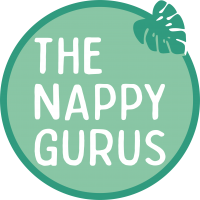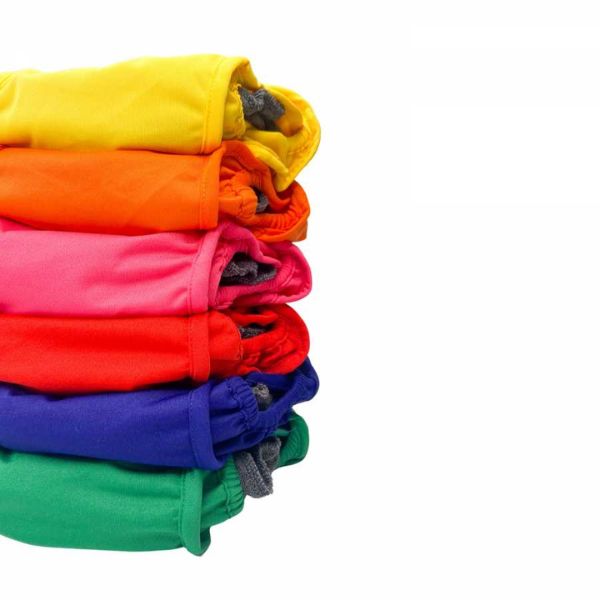Are Reusable Nappies better for the Environment
With many parents in the UK looking to make more eco-friendly parenting choices, it’s important to share just how much of a positive impact switching to cloth nappies can have on the environment.
Our team of experts have highlighted all of the reasons why reusable nappies are far better for the environment than disposable nappies:
1.You don’t need to throw away reusable nappies
Whilst disposable nappies may be seen as the easy option for parents, the UK throws away a staggering 3 billion disposable nappies per year¹, which can take over 300 years to break down in landfill². Each baby uses around 4,000 disposable nappies until they are potty trained³, which is detrimental to the environment and costly for parents. On the other hand, reusable nappies can be used repeatedly, so there’s absolutely no waste involved in comparison to disposables! What's more, once you've finished with your reusable nappies, selling them on can help recoup some of your initial outlay. With more and more people looking to preloved items, this is a sustainable way to both buy and sell on useful items for your family and your home. Check out Preloved.co.uk for the UK's largest community for buying and selling today.
2. Reusable nappies are made more sustainable than disposables
In making disposable nappies, a considerable amount of crude oil is used, a fossil fuel that contributes to emitting dangerous greenhouse gases. It takes over 1,500 litres of crude oil to produce enough disposable nappies for one child (from birth to two and a half years old), which could be avoided if parents chose reusable nappies instead⁴. Crude oil is highly toxic to the environment as it pollutes streams and rivers, which harms animals and habitats, and subsequently, humans⁵. The amount of water used in the making of disposable nappies is also exceptionally greater than the amount used for reusable nappies, as it takes ten times more water to produce single-use nappies than the water used to wash reusables⁶. Disposable nappies are also made of wood pulp, a material that uses gallons of water and creates more waste during the manufacturing process⁷.
3. Switching to reusable nappies encourages the practice of reusing
Reducing the usage of single-use items is a great way to reduce waste and is hugely beneficial to the environment. One of the best things about switching to reusable nappies is that you never have to throw them away, and they can be used for as long as you desire. Once your baby is potty trained and no longer requires nappies, they can be reused for another child, or if you do not plan on having more children, you can give them away to other expectant parents (as long as they are clean!). If every parent reused their cloth nappies or passed them on to another baby, raw materials in manufacturing would be reduced, which would, in turn, benefit the environment.
4. Reusable nappies encourage the use of other reusable products
When you change your baby’s nappy, it’s not just the nappy that can be reusable or eco-friendly, but the other items you use along the way can be too. From reusable wipes and nappy bags to cleansers and baby changing mats, there are so many eco items you can implement into your baby’s changing routine. Once you're comfortable using cloth nappies, why not look into transitioning from other single-use products too? Around 11 billion baby wipes are used every year in the UK, and 90% of these wipes contain plastics that turn into microplastics when broken down, negatively impacting ecosystems when passed through our waterways⁸. This applies to not only baby wipes but also makeup wipes and cleaning wipes.
5. Reusable nappies can be washed in an eco-friendly way
Some parents may be reluctant to switch to reusable nappies due to the washing schedule and number of washes needed. The cost of energy and water is often a concern too, however, the cost isn’t as bad as you may think. An average wash cycle will only cost 16 pence as it uses just one unit of electricity⁹, and if you have an energy-efficient washing machine, a wash costs six pence, which is even better! Based on the use of 60 litres of water per cycle, this is ten times less than it takes to manufacture one single disposable nappy⁹. If you want to avoid using a washing machine altogether, cloth nappies are specially designed to dry quickly, which means they are easy to dry naturally on a washing line outside or on an indoor airer. With this in mind and the recent news of the rise in the cost of living, switching to reusable nappies would be a great way for parents to save money.
Making greener choices every day
Babies require many different products to keep them happy and healthy. However, due to the plastic often found in baby essentials, purchasing so many new items for your baby could be detrimental to the environment.
Now that we are comfortably transitioned into 2022, it’s the perfect time to focus on helping our environment and making daily choices to reduce our carbon footprints. Making more eco-conscious decisions might seem daunting at first, however, switching from single-use nappies to cloth nappies is an easy first step.
If you’re thinking of switching to reusable nappies but don’t know how to get started, why not get in touch with our team of nappy gurus who can provide you with support and expert tips to help you on your eco-friendly journey?
Sources
1. http://www.nappyalliance.co.uk/the-issue/
2. Gathered from the Nappy Guru’s ‘The Great Big Nappy Census’ 2021
3. Make the switch to reusable nappies (dacorum.gov.uk)
4. https://mossy.earth/guides/lifestyle/reusable-nappies-vs-disposable
5.http://oilcare.org.uk/what-we-do/impacts-of-oil/
6. https://www.junomagazine.com/the-environmental-impact-of-nappies/
7. https://mossy.earth/guides/lifestyle/reusable-nappies-vs-disposable
8. https://www.itv.com/news/2021-11-02/what-makes-wet-wipes-bad-for-the-environment-and-why-are-there-calls-for-a-ban
9.https://www.junomagazine.com/the-environmental-impact-of-nappies/


